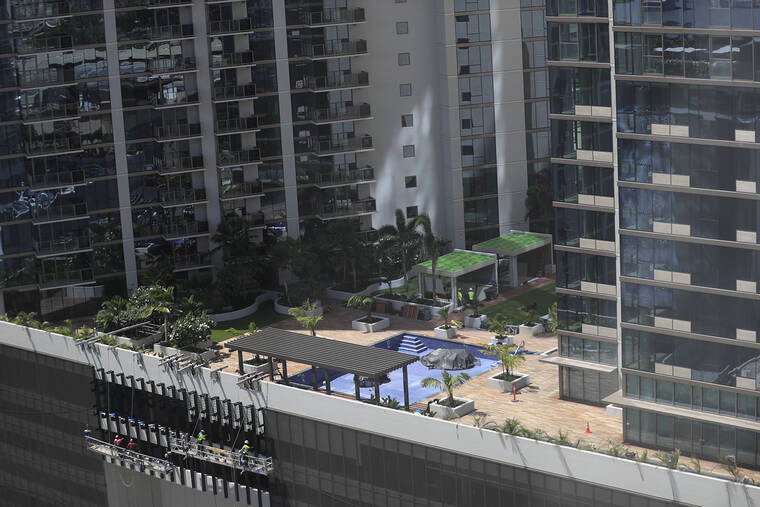
Mahalo for supporting Honolulu Star-Advertiser. Enjoy this free story!
It’s hard to dispute that affordable housing in Hawaii is in critically short supply, but one developer in Honolulu is having a very hard time selling it.
At the Sky Ala Moana towers rising in Oahu’s urban core, market-priced condominiums are sold out at prices from $568,800 to $1.3 million, yet only 14 of 84 units priced from about $270,000 to $515,000 under a city affordable-housing program have sold over the past nine months.
Several factors may have made the affordable condos — mostly studios and some one- and two-bedroom units — unattractive to prospective buyers meeting requirements under city rules that include not earning much above the median income on Oahu.
Possible factors include studios with only 290 or 299 square feet of living space, no access to the pool and other building amenities, an option to buy a parking space for $38,000, and limits on how much buyers can resell their home for if they sell within 10 to 30 years.
During the resale restriction period, a buyer also must live in the unit and cannot rent it out unless special city permission is given.
Ricky Cassiday, a local housing market analyst, said the small studio size and parking at an extra cost are drawbacks. But the biggest detractor, in his view, to selling the affordable condos, called The Flats at Sky Ala Moana East, is the long-term regulation of resales.
“It’s a huge restriction going in,” he said. “You’re married to it for a long time.”
Sky’s developer opted for the 30-year resale restriction for The Flats partly to reduce the number of affordable units it had to include in the project, and in return for the Honolulu City Council approving 300 hotel units in one tower and allowing the entire 774-unit project to be taller and denser than regular zoning rules allow because the project is in a transit-oriented development zone near a planned city rail station close to Ala Moana Center.
Regulatory change
The city has long required developers to include affordable housing for moderate-income residents in residential projects needing a zoning change. But Sky Ala Moana was the first one with a 30-year regulated term, during which a buyer may sell it back to the city or another qualified buyer at a price capping appreciation at 1% per year.
Prior to 2018, the city’s typical regulated term for such homes was 10 years, but sometimes less. Under then-Mayor Kirk Caldwell, an overhaul of city affordable-housing regulations included options for developers to provide more affordable units with five-year restrictions, fewer units with 30-year restrictions or a standard amount with 10-year restrictions.
Sky’s developer, initially a partnership between Honolulu firms JL Capital and Avalon Group LLC, agreed to make 10.9% of the 774 residential and hotel units affordable to moderate-income buyers with the 30-year restriction, instead of 20% or 30% with shorter regulated periods for a transit-oriented project under Ordinance 18-10 established in 2018.
Christine Camp, Avalon president and CEO, at the time acknowledged taking a risk by agreeing to provide fewer affordable condos with a longer restriction period.
“They could be very difficult to sell,” she said in 2018 after the City Council passed a resolution stipulating terms for approving the $510 million Sky Ala Moana project. “Buyers might understand a 10-year buyback period, but some may see a 30-year buyback period as detrimental. We’ll be the guinea pigs.”
Avalon, which is no longer involved with the development, also suggested that the City Council include a “rollback” provision tied to the 30-year occupancy and resale restriction period, whereby the period would be cut to 20 years if such units didn’t sell after 45 days, followed by a cut to 10 years for any unsold units after another 45 days.
Under Sky Ala Moana’s agreement with the city, the rollback applied to half of its 84 affordable units.
Cassiday said the idea of a 30-year restriction is an example of city housing policy clashing with economic realities and a desire for first-time homebuyers to build equity that they can leverage to buy a bigger or better home later.
“It’s ignorance of the buyer,” he said, noting that a single person buying a studio who later got married and had kids would be forced to live in cramped conditions or sell the unit at what could be dramatically less than market price.
“How do you grow into a studio that’s 10% smaller than the market (existing studios without resale restrictions)? It squashes your dream.”
Under the resale formula, an affordable unit can be resold for what the original owner paid plus 1% a year and the cost of any improvements made. For a $300,000 unit sold after 10 years without improvements, the maximum resale price would be $330,000.
The median condo resale price on Oahu over the last 10 years has gone up 61% to $510,000 in 2022 from $317,500 in 2012.
Debated restrictions
The city Department of Planning and Permitting supported the 30-year restriction, calling it the “most critical element” of the new rules that extends a home’s affordability for potentially other buyers and aligns with industry practice in hundreds of localities across the country.
DPP, in testimony before the new ordinance was enacted, also said that some places on the mainland have 60-year or permanent restrictions.
“Some people have argued that the extended period will limit a homeowner’s ability to build equity and move up the housing ladder with a large profit after their period of affordability ends,” the agency said in written testimony. “Nevertheless, the public purpose of the (longer restriction) is to help grow and maintain a stable supply of affordable and workforce housing.”
The nonprofit Hawai‘i Appleseed Center for Law & Economic Justice also backed longer restrictions.
“There are places that require buyback periods up to 100 years,” Gavin Thornton, the organization’s then-co-executive director, said in 2018 as approvals were being debated for Sky Ala Moana. “We need to ensure that we are providing affordable housing for a long time and that it is being built for those that need it most.”
The Land Use Research Foundation of Hawaii, an organization representing developers and large landowners, told the City Council in 2018 that Honolulu’s own housing market history demonstrated that even the 10-year restriction has been problematic, noting the city waived restrictions for owners from 1999 to 2005 as Oahu’s housing market was recovering from a downturn.
LURF said that first-time buyers would purchase homes without restrictions over ones with a 30-year term, and added, “Moreover, these restrictions ‘hold hostage’ homeowners to remain in affordable housing by limiting the amount of equity that a first-time homeowner can earn and use to ‘move-up the housing ladder’.”
Lottery letdown
Associated Real Estate Advisors LLC, a company affiliated with JL Capital, held a lottery for the 84 affordable Sky Ala Moana units in October.
The 84 units are on the bottom six floors of the east tower below 25 stories of hotel units. All the market-price condos are in the west tower spanning 36 floors. Both towers are on top of an eight-story podium containing parking and ground-floor retail and restaurant space.
All the affordable condos initially were reserved for buyers with a household income at or below 120% of the annual median income on Oahu. About a quarter of the units were reserved for households with no more than the median income.
At the time of the lottery, the median income as calculated by the city was $91,500 for a single person and $104,500 for a couple.
Sky Ala Moana’s developer said that excluding owners of affordable units from use of building amenities would keep maintenance fees affordable. Monthly fees for The Flats units are estimated to be $181 to $388 depending on unit size, compared with $487 to $846 for market-price condos.
JL Capital reported receiving over 500 inquiries for the 84 units at The Flats, but only about 20 lottery applications were submitted that resulted in eight sales. Since the October lottery, six more sales have been made.
Of the 14 sales, five units have 30-year restrictions, one has a 20-year restriction and eight have 10-year restrictions.
Now, because of poor sales, the 39 unsold units with 30-year restrictions are available to buyers who may earn up to 140% of the median income, which equates to $128,380 for a single person and $146,720 for a couple.
Timothy Lee, CEO of JL Capital, said the initial sales results were quite disappointing but not surprising. Lee doesn’t expect the 70 remaining units to sell unless the city allows changes to terms governing Sky Ala Moana’s affordable condos.
“There are some conditions in the affordable housing agreement with the city that are creating some challenges for buyers to qualify, so we are working with the city to resolve them,” he said in a statement. “We are working with the city on some rule changes to allow more individuals and families to qualify for these units.”
DPP said that in general, developers selling affordable units under terms they agreed to have other options including reducing prices.
Sky Ala Moana is expected to open in October.
Read More: World News | Entertainment News | Celeb News
Star Ads





